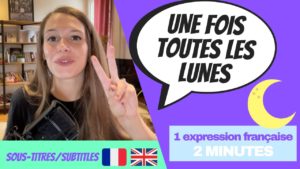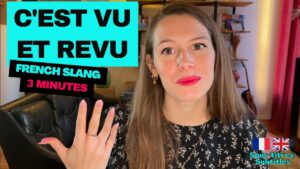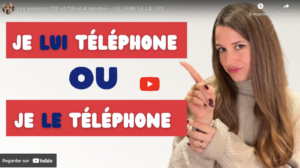Transcript of the video
Hi everyone, hope you're well.
I'm back today with another French video.
Today, we're going to take a look at some false Anglicisms. But what are they?
A few weeks ago, I posted a video with English words we use every day in France. But there are some words that sound like English words. But they're 100% French words.
These are words that don't exist in English. We're going to look at 15 of them today.
Before I begin, I'd like to tell you about a book in this book. Kill The French. I'm often contacted by companies offering to talk to you about their solutions or products. Until now, I've always refused these partnerships because I didn't think they were necessarily interesting for you.
But when I was contacted by the author of this book, I thought it was really very interesting and that it might be worthwhile for you to discover it. I find it very different from other French learning books.
First of all, this book can really help you progress in French, learn more vocabulary, but above all, and this is what I find really interesting about this book, it can really give you self-confidence.
To give you confidence in your ability to progress in French.
In this book, you'll discover 100 stories written in French. What's special about these stories is that they contain a huge number of words that are transparent with English. This means that they are either similar words between French and English, or words that are very, very close.
When you read them, you understand what they mean. Either if you're an English speaker or if you speak a little English. I don't know about you, but when I read a book or an article in English or Italian, if there are too many words I don't understand, I quickly feel lost and give up.
This is not the case here. If you speak a little English, you'll be able to use these words, which are easier to understand, to understand words you don't know.
So, with these words, it creates a context that helps you understand and integrate new vocabulary. So you see, for example, in this story, I'm making chocolate cookies. It's pretty much the same thing in English. For example, story 49 is about music.
In this story, we'll find words like piano, violin, opera, classical music, musician. You see, these are words close to English, so they'll help you understand the rest of the story.
On 34, we're talking about a political speech, so we'll have words like politician, nation, election, president. Below each story, we'll have a few essential vocabulary words that you may not yet know translated.
So you can both understand them through the context and you have an English translation here. The further you go in the book, the more complex the stories are going to be. They get more and more complicated.
You'll be able to make progress. What's also interesting is that the vocabulary words you learn in the first stories come back.
That way, you'll go over the words again. There's a phenomenon of repetition that's essential for learning and retaining new vocabulary. You can find this book, Kill The French, on Amazon. I'll put a link to the book on Amazon in the video description. If you're interested in buying it.
Let's get to the heart of the matter in this video, where we're not talking about identical words in French and English at all. We're going to talk about 100% French words that sound like English.
So be careful not to get confused. We're going to look at 15 of them together today, and I'll explain what they mean.
If you know them, be careful not to use them in English, either because they don't exist in English at all, or because they mean something else.
The first word we'll look at is basketball.
Sneakers is a word we use every day in French. Baskets are simply shoes you wear for sports, or comfortable shoes you wear for everyday wear.
Basket is a basket. So it has nothing to do with it. And yet, if you ask people in France, they'll be convinced that the English word for shoes is baskets.
The word relooking. It's a word we're hearing more and more. There are lots of TV shows where people are given makeovers. We bring them in, we say "ah this type of clothing would suit you better, you need to change your hair...". We'll change their physical appearance to make them look better. In general, when we give you a makeover, it's to make you look better.
In France, people might be convinced that this word is English, but it's not. À nouveau is a word invented in French. In English, I think we'd say "make over".
The next word, a word we use all the time in our daily lives, when we go into furniture stores, is a dressing room. In French, a dressing room is either a wardrobe or the room where you store your clothes.
When people have a room to store their clothes, it's because they have very large houses or are quite wealthy. In general, it's more like a wardrobe, a closet, a cupboard for storing clothes, or a dressing room.
Be careful not to confuse the two, because in English, dressing is more like the sauce you're going to put on a salad, for example. So if I say in English "my new skirt is in my dressing", it doesn't make any sense.
It could totally happen that I'd say that, or that a French person would say that, because you really get the impression that dressing is a word that comes straight from English and is used as it is, but in reality it's not.
A parking lot. So a parking lot, it still looks like the English word.
It's pretty close. In France, a parking lot is a parking space, so it can be either outside or inside a building.
I finally found a parking space after 20 minutes of searching, or I can say, I parked my car in the parking lot opposite your house.
It's the place where you park your car. As I was saying, you can also say parking in French, but parking is really the word that is most frequently, most often used.
So the next word is kind of funny because we've actually just inverted the English word. It's a walkie talkie, whereas in English it's a walkie talkie.
Why the two parts of the word have been reversed, I have no idea. But in French, we say un talkie walkie.
I'm sure you can see what it is, it's often used by the police, or there are some for children too. It's a bit like a cell phone. You can talk into it and communicate with other people. For example, the policeman can communicate with his colleague.
Camping. Here again, it's a word that's pretty close to the English word, but it's not exactly the same. A campsite is a piece of land that has been developed for camping.
You can go on vacation at a hotel or campsite. You go there and pitch your tent. In French, we also say "camping". In English, I think we'd say campsite or camp ground, I think in American English.
Playback. Playback, I'm sure you've been to a concert or watched a musical performance on TV where you realize that the singer isn't really singing, that there's music and she's just moving her lips to pretend she's singing in French, we call that playback.
The singer does playback. This can also be the case for musical instruments. For example, if a musician pretends to play guitar and music comes out of the speakers.
He does playback. Again, it sounds like a word straight out of English, but it's not, it's only used in French. Or maybe in other languages, but certainly not in English. In any case, it doesn't have the same meaning. I think playback means to play, for example, a CD or a record, or I think it just means to listen to something again, playback.
If you're a girl and you've ever been to a hairdresser in France or just looked at the list of services, you've probably seen that word brushing.
Again, it's a word that's not used in English. In English, I think of blow dry. Blow-drying is a technique for styling hair.
When the hair is wet, we will use a hair dryer and a round brush and we will style the hair like this to give it a nice shape.
A people or people. It's a funny word too, because it doesn't have the same meaning in French as it does in English. In English, people simply means people.
In French, if we say that someone is a people, it means that he or she is famous. He's a celebrity. He's famous.
Dry cleaning. In France, a dry cleaner is a place where you can go to have your clothes, bed sheets or coats washed.
It's an establishment where someone takes your clothes and washes them for you. Also do dry cleaning, ironing and it's called a dry cleaner in France.
In English, I think it's called a dry cleaner, so it has nothing to do with it.
Tuxedo. A tuxedo in French is a garment most often worn by men for an evening or event. It's like a suit, but it's worn with a bow tie. And usually, there's an edge here that's going to be satin or silk. I don't know exactly the material, but that's going to be shiny here and we have a bow tie.
A pinball machine. Here, we're not talking about the dolphin at all, but about a game you can find in cafés. It's a big machine where you send a ball and the little metal ball goes through different zones.
You have to make it bounce, and in fact, you win points and mustn't let it fall into the hole. In French, it's called a flipper. In English, it's called a pinball machine.
The next word is cheerleader. Cheerleaders are girls who will perform choreography or acrobatics to support a sports team.
They have uniforms and pom-poms. In French, we say pom-pom girls, so we use girl for gille, whereas in English, we say cheerleader.
For the last words, let's stick to sport. A tennis player. In French, a tennisman is simply a tennis player, such as Rafael Nadal or Djokovic.
And indeed, for a woman, we say a tenniswoman. Once again, it sounds as if the word has been borrowed from the English language. And yet, not at all, because in English, we say tennis player.
And finally, the last word. Un jogging. Un jogging in French can mean two things. Either, if I say I'm jogging, it means I'm going out for a run, I'm doing some sport where I run, I'm doing some running.
Jogging is also used to refer to sports tracksuits. The garment you wear to play sports, but more and more, jogging suits are also worn to hang around the house when you're not doing much. It's a bit like more formal pyjamas.
Here again, it's pretty close to English, but it's not exactly the same word.
That's it for today, I hope you enjoyed this video. If you liked it, put a like and, above all, if you know of any other false anglicisms, don't hesitate to put them in the comments.
If you're interested in the book Kill The French, don't forget, I've included the link to the book's Amazon page in the video description.
I wish you all a very nice day and I say to you very soon.








